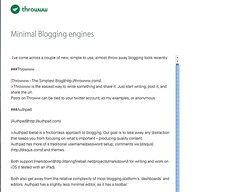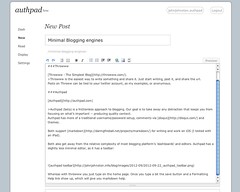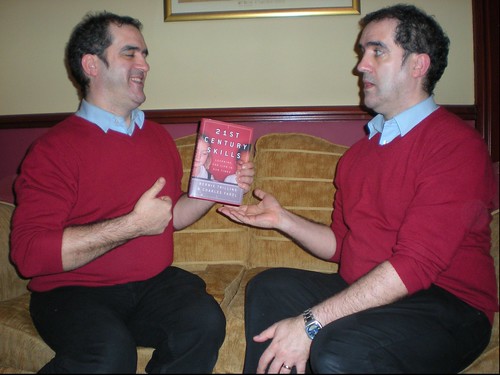This audio file was orginally posted to AudioBoo(m) with the mobile app. It has been downloaded and posted here since audioboom no longer supports free accounts.
Category Archives: wwwd
Minimal Blogging Engines
I’ve come across a couple of new, simple to use, almost throw away blogging tools recently:
Throwww
Throwww – The Simplest Blog. An example post: Minimal Blogging engines – Throwww.com
Throwww is the easiest way to write something and share it. Just start writing, post it, and share the url.
Posts on Throww can be tied to your twitter account, as my examples, or anonymous.
Authpad
Authpad my example
Minimal Blogging engines – johnjohnston’s Pad.
Authpad (beta) is a frictionless approach to blogging. Our goal is to take away any distraction that keeps you from focusing on what’s important — producing quality content.
Authpad has more of a traditional username/password setup, comments via disqus and themes.
Both support markdown for writing and work on iOS (I tested with an iPad).
Both also get away from the relative complexity of most blogging platform’s ‘dashboards’ and editors. Authpad has a slightly less minimal editor, as it has a toolbar:

Whereas with throwww you just type on the home page. Once you type a bit the Save button and a Formatting Help link show up, the latter will give you markdown help.
Authpad also gives you an option to publish as website or a blog style.
Both, in my limited testing, are straightforward and easy to use. I an not sure that they are tools for the classroom, markdown and hosting images elsewhere might be a wee bit complex for pupils. They might fit with some teachers for their own publishing, certainly they are quick to use.
I am also not sure where they fit with the current trend to reclaim ones data from web 2, or a Domain of One’s Own or Un-Web 2.0 which I am finding interesting at the moment.
A couple of other similar things, Calepin which I’ve not tried and Scriptogr.am which I tested a while back: John Johnston | scriptogr.am.
#EDUtalk at SLF, TMSLF12 and tmSLFRINGE12
This is an invitation to those attending the Scottish Learning festival, TeachMeet SLF 2012 or TeachMeet SLF fringe to share their thoughts and reflections via EDUtalk.
Three years ago, David Noble and myself organised, SLFtalk – Audio publishing by attendees at the Scottish Learning Festival, the idea was to gather reports and reactions from the floor of the Festival from anyone who wanted to join in.
This developed into EDUtalk – Audio publishing by educators, using mobile devices which has now collected around 400 audio recordings about education.
This year, I am not going to the Festival or TeachMeet, I’ve a 25th anniversary to celebrate and although I’ve spent the odd anniversary at TeachMeet before, I am not going to miss this one.
I realise that I’ve been very privileged to attend SLF for a number of years (Thanks to MasterClass, Glow, Moira McArthur now NLC council ) and not many teacher get the chance. This was one of the reasons behind SLFtalk.
This year
I would like to know what is going on. I am sure I’ll read blogs posts and news from Education Scotland but I would also like to hear from folk attending. I am sure this is true for many others.
Why Audio?
I believe that audio has some advantages:
- For the listener it can be listened to when doing something else, the dishes or driving. It also brings an extra dimension of information from the sound of the voice.
- For the recorder it is quicker to get ideas down by a quick recording than it is to write. It is also very easy to publish.
So if you are going to the Scottish Learning festival, or attending TeachMeet SLF 2012 or TeachMeet SLF fringe please send us your thoughts and reflections.
How to contribute
Contributions to EDUtalk are supposed to be easy to do, we are not looking for polished pieces of audio, although these will not be turned down![]()
There are 3 main ways of contributing now:
- Email any audio to post@EDUtalk.posterous.com
- Tag an Audioboo edutalk
- Tag an ipadio phlogs edutalk
There are of course many many ways to record audio, most devices, computers,smart phones and mp3 players have applications do do this. You could use any one of these, all you need to do is save an audio file, mp3, aif, wav etc and mail it to post@EDUtalk.posterous.com. If you can send an mp3 and save yourself some audio, but any audio format will do.
Audioboo and iPadio both have smart phone applications that are free. You just need to download then onto your phone, record audio and tag that audio edutalk, Audioboo limits you to 2 minutes with a free account but it is surprising how much information you can give in 2 minutes.
What to talk about
Anything you want really, as long as it is about education. Some ideas:
- A conversation with a colleague following a formal session
- chat with a presenter after their session
- you own reflections on a session attended
- about a stall or product on floor (no adverts!)
- conversation with colleague about recent teaching and learning
- a group discussion that you are part of.
- or something else…
Pick up the mic or phone
Please do, I think we need to hear from all sort of folk talking about all sorts of things in Scottish education. If you are a regular voice or have never published anything, HMIE inspector or probationer, leader writer or blogger please think of adding your voice to the EDUtalk mix.
Cross posted at http://JohnJohnston.info/blog and http://edutalk.info
iPads in School – do your homework
The reader, who asked not to be identified, is an ICT co-ordinator at a secondary school. He tells how his “image-conscious” headmaster was seduced by a scheme that allowed all the school’s staff to replace their laptop computers with an iPad 2.
Our source says staff were initially thrilled at the prospect. “Most staff are IT illiterate and jumped at the chance of exchanging their laptop for an iPad,” he writes.
Now, however: “the staff room is full of regret.”
What’s gone wrong? The biggest obstacle is that staff still cling to old documents and resources created in software such as Microsoft Word and PowerPoint, and of course there aren’t fully-fledged versions of the Office apps available for the iPad as yet. “Some staff are needing to produce documents and resources by remoting in [to a PC] on an iPad,” our source reveals. “Trying to operate Microsoft Word using a remote app that dumps you out of the connection is a nightmare.”
from: The school that swapped its laptops for iPads… and wants to switch back | PC Pro blog
There is at least a The iPad experiment hasn’t been a total disaster paragraph and a good number of comments explaining correcting and discussion.
It looks like the school jumped into iPads without doing any research to see if iPads fitted their needs. Staff welded to MS office for essential tasks will struggle with an iPad. Most of the problems could be surmounted with a bit of research into replacement apps (pages, keynote, Haiku deck and many many more) and distribution (dropbox, which they use, and webdav (Otixo adds webdav to dropbox) and some staff development/training.
Personally I would not yet like to give up a desktop/laptop for an iPad in all circumstances and certainly would have hated to be pushed into making that jump without training and practise.
Sidenote, One of the commenters remarks that tablets are for consumption and not creation. This was I though buried. From a few visits to the primary classrooms piloting iPads in North Lanarkshire I see a whole lot of creation by pupils going on.
Enviable Stuff 2012-09-10
David Baugh points to Pinnacle studio iPad video editor.
I was delighted to find a more feature rich video editor for free in Pinnacle Studio and even better – for now it is free.
from: Learning in Touch » Blog Archive » Free Video Editing iPad App from Pinnacle Studio with multi layer video David has a great Digital Storytelling page too.
I’ve mostly though about MOOCs as cpd , but…
So, what does this have to do with K-12? Everything. Or at least a lot. If this is the wave or a wave of the future of learning and teaching then this is something that we need to pay attention to. If the job of parents, K-12 educators and the public school system is to prepare students for the environments they will be expected to work and learn in, then we ought to pay very close attention.
from: What is a MOOC? The Canadian Connection.
This and the others in the Honest Logos set made me laugh, but perhaps an interesting take on the design a logo activity?

image Creative Commons — Attribution-NonCommercial 3.0 Unported — CC BY-NC 3.0
from: Honest logos on the Behance Network
Notes on eAssessment Scotland
Yesterday I went to eAssessment Scotland at the invitation of Kenji Lamb, @kenjilamb. Kenji appeared on Radio Edutalk, Radio #EDUtalk 18-4-12: Kenji Lamb on Open Source Technologies – EDUtalk, and kindly asked David and myself if we would like to do some recording at the conference.
I am taking a wee break from organising show notes for the posts to jot some notes down. Ian Guest In the pICTure and Colin Maxwell have already posted about the conference E-Assessment Scotland 2012 in more depth and detail than these random notes.
Similarities
Most of the attendees were from Higher Ed rather than school, but my main takeaway from the conference was that there are remarkable similarities between the different sectors of education and many similar explorations going on.
David Boud kicked off with the first keynote talking about feedback which became, for me, the lens that I looked at the rest of the day through. Giving learners ownership, worthwhile feedback and the difficulty in doing so appeared in many narrative and conversations during the day. I was surprised that the phrase formative assessment did not come up frequently as it seem to me it was part of what every one was talking about.
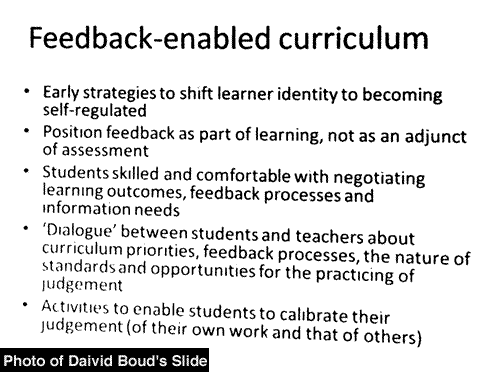
I was expecting a lot more about automatic computer generated assessment and was delighted not to find any.
Radio EDUtalk
I was sort of expecting to be trying to grab folk in corners and record short boos with them, in fact Kenji had really sorted us out. We had a room with several ethernet points and more importantly Lynn Boyle, @boyledsweetie, had the role of childcatcher (or Roundup Girl) organising presenters, keynote speakers and others to come to our booth.
I started out feeling a wee bit out of my depth in such higher ed surroundings. I was soon very happy as it became obvious that all our interviewees were gracious and generous. I’ve started to post the series over at EDUtalk tagged ‘eAS12’. This will take a couple of days as I’ve decided to make a bit more effort than usual with the shownotes. I’ve spent a fair portion of yesterday hunting down links and trying to avoid reading too much on the blogs I am finding. My gReader account has bulged again..
WordPress, wordpress, wordpress…
I was surprised how often educational blogging came up. Lots of interesting projects, open and closed are happening in higher Education, this parallels (again) schools. One of the seminars was directly about schools, Alex Duff of education scotland on Enabling Pupils to Record and Reflect on their Educational Experiences using WordPress. I am very familiar with the glow blogs as eportfolio system, having spent a fair amount of time training teachers in setting them up and working with classes to do the same. It was still well worth listening to Alex, it made me again appreciate all of the work done to make the blogs server the purpose of Building the Curriculum 5 and local authorities, creating a profile from a profiling blog. This is done with some wordpress cleverness. Considering the Glow install of wordpress is hampered by being an old version and the lack of opportunity to add plugins makes this even more impressive.
Later in the day Alex was presented by a well deserved eAssessment award.
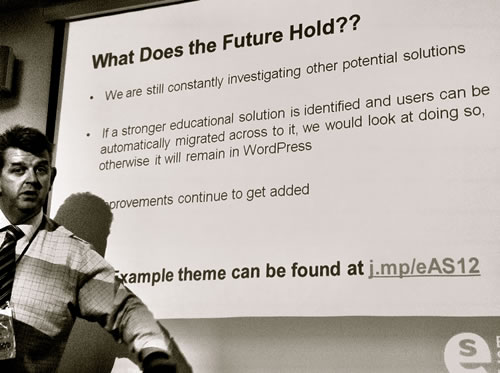
I was interested to hear how Alex had evaluated various portfolio solutions before plumping for the blog and that Education Scotland are open to improving these as glow changes.
Links
As I continue to work my way through the shownotes for Radio Edutalk I am gathering some great links adding to the folk I follow on twitter and the list of blogs I follow. Here are a few that were new to me:
- Russell Stannard’s website teaching videos is one I’ll pass on to the teachers I work with. His method of providing feedback to students via screencasts of himself talking over the students work was really interesting.
- Chrissi Nerantzi‘s blog as does Cristina Costa’s skimming through the last few posts gets some mooc stuff and Why Facebook and teaching don’t go together.
- JISC CETIS MASHe Martin Hawksey’s blog looks like it is full of scripty goodness that is just over my head at the moment but some of his interests (aggregation) match mine.
- Sheila’s work blog » #moocmooc posts should help get upt to speed with moocs. Although I’ve hung about ds106 a fair bit over that last year or so some background reading will help.
There are a lot more links in the EDUtalk – Filed under ‘eas12’ posts and I’ve collected them all together: eassessment scotland 2012 · linkli.st. At the time of typing this I’ve not uploaded all the audio or posted all the links. I hope to finish later today.
Connections
It looked like it was going to be one of those bump into folk day when I met Derek Robertson between the station and university. Derek was introducing the second keynote of the day and took us out of Highrer Ed into the infant room with a tale of 5 year olds creating instructionla videos with very little support!
As I walked into the conference I immediately saw Malcolm Wilson the first of many online pals. Malcolm is ICT Curriculum Development Officer for Falkirk Council Education Services and produces one of the most valuable blogs for using ICT in the classroom: ICT for Teaching & Learning in Falkirk Primary Schools which is useful well outside Falkirk. His recent post on Microsoft Office 365 for Education looks like saving glow users a fair bit of spadework.
I met for the first time Ian Guest (IaninSheffield) on Twitter. Ian has been an EDUtalk stalwart tagging his boos for his 366 Web 2.0 – A Web 2.0 tool-a-day for 2012 project with edutalk.
Alex Duff, whose seminar I attended was another grab a few words meeting. All three of these folk I would have liked to spend more time with as I have a pile of conversations and questions for them all.
Another quick chat with Colin Maxwell whose presentation on Investigating MOOCS sounded as if it would have been fascinating. I was glad to see is tweet:
I’ll be recommending that to teachers interested in ICT if it comes up again.
Finally David and myself grabbed a bite to eat with Doug Belshaw, Doug now works with the Mozilla Foundation where he heads-up their work on web literacies. There are probably not enough hours in the day for me to badge him about Hackasaurus, Open Badges and the like. I was disappointed not to see Doug’s seminar on Are Open Badges the Future for Accrediting Skills? I caught the last couple of Q&As which only made me more curious.
Many thanks to Kenji Lamb for inviting Radio Edutalk to attend. If you didn’t make the conference you might enjoy the archive from our live stream: EDUtalk – Filed under ‘eas12’
Radio #EDUtalk at eAssessment Scotland 2012
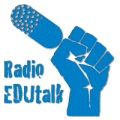 I am having an early start today. A while back we had Kenji Lamb on Radio EDUtallk. He kindly invited us to the eAssessment Scotland 2012 conference to do some recording.
I am having an early start today. A while back we had Kenji Lamb on Radio EDUtallk. He kindly invited us to the eAssessment Scotland 2012 conference to do some recording.
The conference has a really interesting looking program. Some of the participants joined David and I for our regular live show earlier this week which was fascinating. We hope to be broadcasting live on Radio EDUtalk throughout the day of we can. Hopefully we will tweet: #edutalk the segments as they go live.
If you are listening live the quality may be better with iTunes, WMP or other non browser method as we will be switching between live and Auto DJ regularly.
Blogged with a hand knitted system
Haiku deck
Haiku Deck is
the simple new way to create stunning presentations – whether you are pitching an idea, teaching a lesson, telling a story, or igniting a movement, it’s fast, fun and simple for anyone to use.
Says Haiku Deck. It is an iPad application for making presentations. Very simple to use and the defaults look nice.
That took about three minutes to knock up. The main feature, based on three minutes use, seem to be a nice search to find images to match your words. Looks like it searches Flickr and some other sources. It does some sort of cc search. I don’t think it quite respects the license though. This image:
By David Muir is licensed under a Creative Commons — Attribution-NonCommercial-NoDerivs 2.0 Generic — CC BY-NC-ND 2.0 license. Unfortunately the app does not seem to do the attribution for you.
Haiku deck says:
Where do Haiku Deck images come from?
Haiku Deck finds images from across the Internet that photographers have licensed under the Creative Commons license. Some Creative Commons images carry a “not for commercial use” restriction. If you’re making a Haiku Deck for commercial use, please be sure to turn the “commercial use only” filter.
I am not sure that is in the spirit of the attribution part of the license?
It does however make a very presentable presentation pretty quickly, saving to the web, announcing by twitter and providing an embed code. It also exports to PDF via mail.
The price is right, free with some paid for themes, the app is extremely easy to use and if they added attribution to the images it would be even better.
Update, my bad: I had adjusted the embed code to fit the iframe into my blog the attribution appears on the Haiku Deck website: Radio #EDUtalk – A Haiku Deck from Giant Thinkwell and on the embed if you don’t mess about with the code to resize the iFrame. Apologies to Giant Thinkwell.
So here is the attribution copied from the Radio #EDUtalk – A Haiku Deck from Giant Thinkwell page:
- image by @notnixon by-nc-sa/2.0
- image by David Muir by-nc-nd/2.0
- image by express0
- image by nosha by-sa/2.0
- image by ian munroe by/2.0
Much to my embarrassment I asked about this on twitter: Twitter / kleneway: @johnjohnston @HaikuDeck you …
Update 2: I’e also noticed a nice feature, republish a slideshow with an extra slide updates the original and the embed.
Blogged with a hand knitted system
Internet Safety: Facebook Design
It should be no surprise that in the new App Center Facebook made another leap forward in their efforts to get you to expose your personal info without realizing you’re doing so.
from: 5 Design Tricks Facebook Uses To Affect Your Privacy Decisions on TechCrunch could be used as a lesson in Internet Safety or perhaps design![]()
Enviable Stuff 2012-08-26
Classroom ideas
I want all the children I teach to develop a love of learning, not for ticks, badges or scores, but for the buzz of learning.
from: Robert Drummond » Blog Archive » 20% time Robert is giving his pupils free learning time in the same way Google developers get to follow their own interests, I am looking forward to see how this goes.
Here is the exam. Write your own questions. Write your own answers.
from: Seth’s Blog » Blog Archive » Tyler Cowen’s Unusual Final Exam I guess it would take a bit of work to get this going in class, but echo the 20% for me.
When you click on ‘Sign in with Glow’ you will be taken to the Glow login page. Here you can login to Glow using your usual username and password. At Glew we won’t know these details and they stay secure with you.
from: Using Glow to make a Glew Account | Glew.org.uk Charlie Love makes Glew an even more interesting choice. If I was in class I’d give it a go.
Online learning
“Mechanical MOOC” – a free and open introductory course in the programming language Python that weaves together existing resources (content, Web-based study groups, quizzes and so on).
from: The Mechanical MOOC Audrey Watters point to this new MOOC, No degrees or credits or certificates or letters of achievement will be awarded, if I though it would only involve a couploe of hours a week I’d join up.
Mozilla wants to create a generation of webmakers.
from: What we’re up to with Mozilla Webmaker (Open) badges. | dougbelshaw.com/blog Doug now works for Mozilla Foundation. I am all for making more webmakers, and am interested in how badges play out, less sure of badges effectiveness (see the first quote in this post). I suspect badges need to be augmented by personal or social media, I didn’t find codeacedemy badges much of an incentive. I am looking forward to seeing Doug speak at eAssessment Scotland this Friday.
An introduction for new programmers
So easy your human companion could do it too!
from: JavaScript for Cats looks pretty useful, I think I am involved in an intro to HTML, CSS and baby steps JavaScript for computing teacher later this year.
Odds and Ends
Alan O’Donohoe who has produced some great AudioBoos (some of which he kindly tags EDUtalk), is looking for donations to get a pro account:
Audioboo Appeal « Teach Computing.
What I am questioning, however, is whether the logic of Capital and private enterprise should be applied to the institutions of our state. Some things, after all, are public goods.
from: Some thoughts on time, performativity, and the State. | dougbelshaw.com/blog a good question.
Tuttle SVC: Should Teachers Consider TED a Reliable Source? Why, Exactly?
Techy
- Create a bootable iso image for Mountain Lion « Scatter/Gather
- Introduction to .htaccess – Codular I actually edited a .htaccess this week. I need to know a bit more, this should help.

